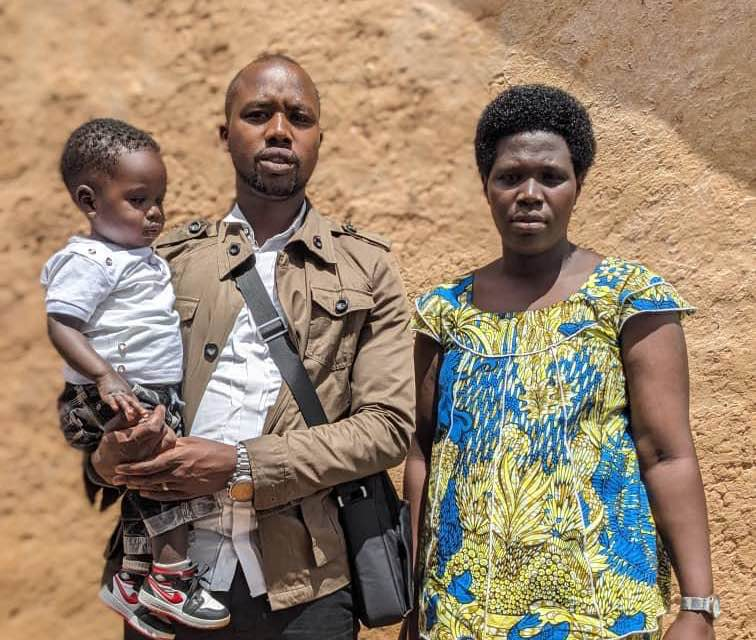
A ray of hope appeared for Mugisha Pandasi last Thursday as he received news he was approved for resettlement in the USA at the end of November.
The dream of a better life, once seemingly unattainable, was now a reality for the 31-year-old Congolese refugee and his family after living in Kiziba camp, nestled within the hill chain of western Rwanda, for almost three decades.
“It was like dreaming during daytime,” Mugisha shares how he felt when the UN Refugee Agency (UNHCR) staff informed him of feedback from his previous resettlement interviews. “This is a rare chance for refugees.”
Mugisha envisions a brighter future in the USA, where he can provide not only for his firstborn daughter aged 18 months, his wife, and siblings but also support his relatives still living in the camp.
“Here, we only struggle to get a daily meal; we never care about what may happen to us the following day,” he says, emphasizing the stark difference between life in the camp and the opportunities awaiting him in the USA. “I am ready to do any job that will enable me to earn money and support my family.”
However, the idea of such a chance never crossed Mugisha’s mind years ago. Raised in the refugee camp, his life has been profoundly shaped by the challenges of being a refugee.
The oldest of eight siblings, Mugisha’s journey of hardship began in 1996, when militia violence escalated, forcing his family to seek refuge in Rwanda. He was just four years old. Little did he know that his childhood memories would be forever overshadowed by the challenges of life in a refugee camp.
Life became even harder when he lost his father to an accident in 2015.
Recalling a time when they endured three months without proper food rations, he paints a vivid picture of the struggles faced by his family and fellow refugees. Life became an arduous journey of survival, with each day presenting new obstacles for Mugisha and his relatives.
He for instance pursued his education inside the camp until senior three, but financial constraints prevented him from completing his secondary education outside the camp as his family could not afford the cost.
UNHCR has been working with generous countries to welcome vulnerable refugees like Mugisha so that they can get a second chance at life through resettlement and other ways that allow refugees to move to third countries.
Since the beginning of 2023, over 6,200 refugees in Rwanda have departed to USA, Norway, New Zealand, Australia, Netherlands, France, Finland, Denmark, Belgium, and Canada.
In addition, UNHCR has submitted 39,490 refugees from DRC for resettlement since 2012 – including 5,965 individuals in 2023 – in recognition of their vulnerability and length of time they have lived in Rwanda. In recent years, the number of refugees departing Rwanda has grown exponentially primarily driven by resettlement to the USA. UNHCR works with the International Organization for Migration (IOM), in facilitating the departures.
“In Rwanda, UNHCR strategically uses resettlement as a protection tool for vulnerable refugees, as well as a solution for refugees who have lived in the country for many years,” commented UNHCR’s Representative in Rwanda, Mrs. Aissatou Ndiaye. “In 2023, UNHCR is working with 10 different countries who have put forward resettlement quotas for refugees in Rwanda. This work also complements our increasing efforts to find solutions for refugees through local integration in Rwanda and repatriation back to their countries of origin.”
While thousands of refugees have departed Rwanda over the last decade, UNHCR continues to work with resettlement countries to follow-up on the cases still awaiting a decision as well as submit additional refugees as new resettlement quotas become available. In Rwanda Congolese refugees are prioritized for resettlement although small numbers of Burundians are also resettled especially for extremely vulnerable or medical related cases.
As Mugisha prepares to embark on this life-changing journey, he hopes that his 18-month-old daughter will have a chance to access a better education in the USA, unlike what happened to him.
“This is not just a lifeline for my family but an opportunity to build a foundation for a future filled with hope and the chance to give back to those left behind in the camp,” he says. “I wish my child and younger siblings get quality education to empower themselves and make meaningful contributions to society.”
